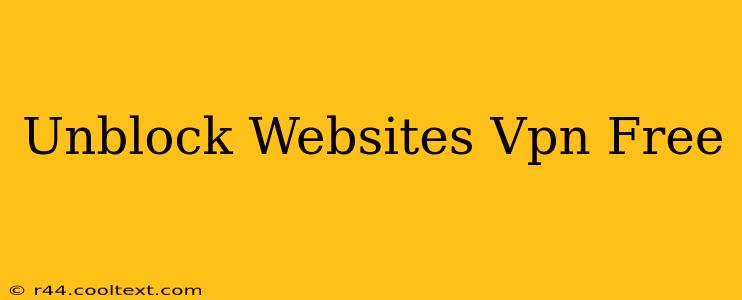The internet should be open and accessible, but geographical restrictions, censorship, and network limitations often prevent us from accessing certain websites. This is where free VPNs come in, offering a potential solution to unblock websites and browse freely. However, it's crucial to understand the nuances and limitations before diving in. This guide will explore the world of free VPNs for unblocking websites, highlighting their benefits, drawbacks, and crucial considerations.
What is a VPN and How Does it Unblock Websites?
A Virtual Private Network (VPN) creates a secure, encrypted connection between your device and the internet. Think of it as a tunnel protecting your data. When you use a VPN, your internet traffic is routed through a VPN server located in a different location. This masks your IP address, making it appear as though you're browsing from the server's location. This is how it bypasses geographical restrictions and unblocks websites that might be inaccessible in your region.
Benefits of Using a Free VPN to Unblock Websites
- Bypass Geo-restrictions: Access content unavailable in your country, such as streaming services or specific news websites.
- Enhanced Privacy: Mask your IP address, making it more difficult to track your online activity. (Note: The level of privacy offered by free VPNs is often significantly lower than paid services.)
- Improved Security: A VPN encrypts your internet traffic, adding an extra layer of security on public Wi-Fi networks. (Note: Free VPNs may have weaker encryption and security protocols.)
- Circumvent Censorship: Access websites and content blocked by governments or organizations.
Drawbacks of Using Free VPNs to Unblock Websites
While free VPNs offer appealing advantages, it's vital to acknowledge their limitations:
- Limited Bandwidth: Free VPNs often have data caps, restricting the amount of data you can use. This can severely impact your browsing experience, especially for streaming or downloading.
- Slower Speeds: Free VPN servers are usually overloaded, leading to slower internet speeds compared to paid VPN services.
- Security Risks: Some free VPNs log your browsing data, compromising your privacy, or even inject malware into your system. Choose carefully and research thoroughly!
- Limited Server Locations: Free VPNs usually offer fewer server locations than paid services, limiting your options for bypassing geo-restrictions.
- Annoying Ads: Many free VPNs bombard you with intrusive advertisements to generate revenue.
Choosing a Safe and Reliable Free VPN
Finding a trustworthy free VPN is a challenge. Thorough research is crucial. Look for VPNs with transparent privacy policies, positive user reviews, and a strong reputation. Be wary of VPNs promising unrealistic speeds or unlimited bandwidth – these often come with hidden costs or security risks. Check independent reviews and security audits before making a decision.
Alternatives to Free VPNs
If privacy and security are paramount, consider the following alternatives:
- Paid VPN Services: While they involve a cost, paid VPNs offer superior speed, security, and privacy features.
- Smart DNS: This technology can help unblock websites without encrypting your traffic, offering a potentially faster alternative.
Conclusion: Proceed with Caution
Free VPNs can be a useful tool for unblocking websites, but they come with significant drawbacks. Carefully weigh the risks and benefits before using one. Prioritize your privacy and security by thoroughly researching the provider and understanding the implications of using a free service. Remember, a secure and private online experience is often worth the investment in a reputable paid VPN.

